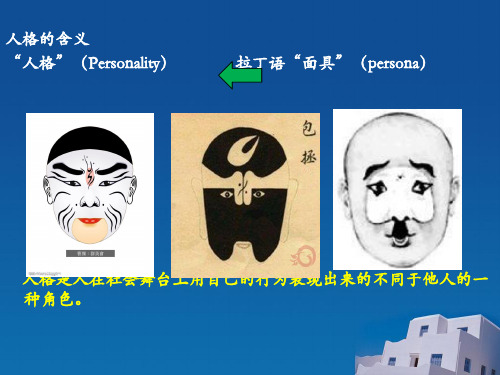PersonalityPPT教学课件
合集下载
Personality (1)PPT教学课件

I wouldn’t call myself int你ro内ve向rt还ed是t外ho向ug?h sometimes I’m reserved and enjoy staying all by myself,often I like sharing activities with others.
我不算内向,尽管有时我沉默寡言,喜欢独处,但我经常和大家一起活 动。
• Secretary
Easy-going, sensitive, frank, efficient, careful, cautious
• spokesman
Intelligent, talkative, diplomatic, cautious
2020/12/12
19
Character and personality
• You are optimistic and enthusiastic
2020/12/12
14
CAPRICORN-The Goat
• You are ambitious, earnest and responsible
• Sometimes you are stuffy and precise in manners
• Doctor
Calm, independent, careful, sympathetic
• Policeman
Brave, alert, strong, calm
• lawyer
Persuasive, expressive, serious, knowledgeable
2020/12/12
18
Yellow
Someone you will never forget.
我不算内向,尽管有时我沉默寡言,喜欢独处,但我经常和大家一起活 动。
• Secretary
Easy-going, sensitive, frank, efficient, careful, cautious
• spokesman
Intelligent, talkative, diplomatic, cautious
2020/12/12
19
Character and personality
• You are optimistic and enthusiastic
2020/12/12
14
CAPRICORN-The Goat
• You are ambitious, earnest and responsible
• Sometimes you are stuffy and precise in manners
• Doctor
Calm, independent, careful, sympathetic
• Policeman
Brave, alert, strong, calm
• lawyer
Persuasive, expressive, serious, knowledgeable
2020/12/12
18
Yellow
Someone you will never forget.
最新10.personality教学讲义ppt

• Genital stage : In Freud’s theory of personality development, the final stage of normal adult sexual development, which is usually marked by mature ality.
10.personality
Overview
• Personality • Psychodynamic theories • Humanistic personality theories • Personality assessment
Unconscious theory
• Conscious • Freud’s first level of awareness, consisting of the
How personality develops
• Latency period : In Freud’s theory of personality, a period in which the child appears to have no interest in the other sex.
• Anal stage : Second stage in Freud’s theory of personality development, in which a child’s erotic feelings center on the anus and on elimination.
How personality develops
thoughts, feelings, and actions of which people are aware. • Preconscious • Freud’s second level of awareness, consisting of the mental activities of which people gain awareness by attending to them. • Unconscious • Freud’s third level of awareness, consisting of the mental activities beyond people’s normal awareness.
10.personality
Overview
• Personality • Psychodynamic theories • Humanistic personality theories • Personality assessment
Unconscious theory
• Conscious • Freud’s first level of awareness, consisting of the
How personality develops
• Latency period : In Freud’s theory of personality, a period in which the child appears to have no interest in the other sex.
• Anal stage : Second stage in Freud’s theory of personality development, in which a child’s erotic feelings center on the anus and on elimination.
How personality develops
thoughts, feelings, and actions of which people are aware. • Preconscious • Freud’s second level of awareness, consisting of the mental activities of which people gain awareness by attending to them. • Unconscious • Freud’s third level of awareness, consisting of the mental activities beyond people’s normal awareness.
第五课第一节认识人格PPT课件

粘液质试题
30、不喜欢长时间谈论一个问题,愿意实际动手干。 33、理解问题常比别人慢些。 39、老师讲授新知识时,总希望他讲慢些,多重复几遍。 43、不能很快地把注意力从一件事情转移到另一件事情 上去。 45、认为墨守成规比冒风险要强一些。 49、对工作抱认真严谨、始终一贯的态度。 55、在体育活动中,常因反应慢而落后。 57、喜欢有条理而不甚麻烦的工作。
人格的含义 “人格”(Personality)
拉丁语“面具”(persona)
人格是人在社会舞台上用自己的行为表现出来的不同于他人的一 种角色。
人格的要素
1.认可 2.适应 3.平衡 4.智慧 5、团队意识
什么是智慧力? 智慧力就是个体吸收、接受信息,并且对信息 进行有效加工的能力。这里所谓“有效”,就 是有助于个体正常地满足需要,并且让需要的 满足向自我实现的方向和接近。从狭义上来讲, 智慧力就是智力。从广义上来讲,智慧力就是 认识“大道”的能力。
• 主要特点:反应缓慢但具有稳定性,沉着冷静但
缺乏生气,踏实稳重但刻板冷漠。
抑郁质
• 感受性高、观察细腻、善于察觉常人不易注意的细微 末节,反应慢,动作迟缓;情绪的敏感性极高、常表 现出多愁善感和敏感多疑的特点、而且情绪反应强烈 、体验深刻且持久,但情感内抑、很少表露于外;严 重内向、极不善交际、性情孤僻 ;为人处事极谨慎、 对挫折及困难易产生畏惧心理。
征,从而使性格特征具有独特的色彩。 3、气质还会影响性格特征形成或改造的速度。
性格与气质的关系
区别: ①从起源上:气质受先天因素影响大,具有先天性,
形成较早,表现在先;而性格是后天形成的,形 成较晚,具有社会性。 ②从可塑性上:气质较为稳定,可塑性小;而性格可 塑性强,可随环境的影响而变化。 ③从评价上:气质无好坏之分,性格有好坏之分。
人格 PPT课件

2018/5/23
11
第三节 人格的测量
一、行为评定法 主要包括观察法、谈话法、作品分析法、个案法。 二、自然实验法 三、测验法 主要包括自陈法和投射测验。
主题统觉测验 罗夏克墨渍测验
2018/5/23
12
案例:从“拾柴火”看性格模式
苏联心理学家阿格法诺夫设计了“拾柴火”的自然 实验,实验对象是保育院的 40 个学生。实验是在冬天 晚上进行的。实验者把湿柴放在附近的棚子里,而把干 柴放在较远的山沟里,要求学生必须在晚上去拾柴生火 取暖,自己隐蔽在一旁观察。结果发现有的孩子是兴高 采烈地到山沟里去了;有的则边走边发出怨言;有的不 敢走远,只是到附近的棚子里去取湿柴。后来实验者对 他们讲了有关勇敢者的故事,于是到山沟里取柴的人渐 渐多了。经过几个月的教育和观察,发现有 20 个孩子 发生了较大的变化。
2018/5/23
45
?
?
? ?
2018/5/23 46
猜猜看他们是 什么类型?
2018/5/23
47
某六年级男学生(12岁)
这是一个非常活泼、好动的少年。走路敏捷,连蹦
带跳,说话很快、易受感动、容易着迷、能绘声绘色、
情绪激动地讲述看过的电影、读过的书籍。他也很容易
对课程感兴趣,对每一新事实或新作业都迅速做出反应, 但不喜欢复习学过的知识。同时他的兴趣和意向很不固 定、很不稳定。在热心于一件新事情之后,很容易又冷 淡下来。有着强烈的表现欲望,善于面对陌生的环境,
2018/5/23 13
点评:
由此实验我们知道:孩子们的性格是有
差异的——有的勇敢主动,有的畏缩图方
便;有的动摇,有的则是胆怯。而他们的 性格通过教育或后天的培养训练是可以改 变的。
personality(性格特点)(1).ppt

2. What can we do to help those disabled like the old blind man?
Reading strategy
Stories usually have the following elements in common.
a plot (情节) main characters (主要人物) a certain time period ( 特定时间)
a place
a problem or an issue to be solved a climax (高潮) or a surprise ending
Writing
Work in groups and write a story with a surprise ending.
Homework
Read the story carefully and try to find the route (路线) that Polly took home.
outside Polly’s working place at the bus stop on the street
in the Underground train at Green Park station
1. (Lines 15-16) …she sensed that she was being watched by a tall man in a dark coat.
Why was a tall man mentioned here?
2. (Lines 22-23) …Polly felt a rough hand brush her face …
With the help of the old blind man.
Reading strategy
Stories usually have the following elements in common.
a plot (情节) main characters (主要人物) a certain time period ( 特定时间)
a place
a problem or an issue to be solved a climax (高潮) or a surprise ending
Writing
Work in groups and write a story with a surprise ending.
Homework
Read the story carefully and try to find the route (路线) that Polly took home.
outside Polly’s working place at the bus stop on the street
in the Underground train at Green Park station
1. (Lines 15-16) …she sensed that she was being watched by a tall man in a dark coat.
Why was a tall man mentioned here?
2. (Lines 22-23) …Polly felt a rough hand brush her face …
With the help of the old blind man.
PersonalityPPT课件

2020/10/13
10
Sensing理智型/Intuiting直觉型
This preference describes your dominant way of taking in information.
• Sensors prefer tangible, concrete, observable, and objective stimuli.
Personality
2020/10/13
1
Personality
the patterns of behavior, thought, and emotion unique to an individual, and the ways they interact to help or hinder the adjustment of a person to other people and situations
2020/10/13
3
Key Facets of Personality
Emotional stability describes your behavior under distress.
Conscientiousness describes your organizing ability and perseverance.
汇报人:XXXX 日期:20XX年XX月XX日
14
2020/10/13
2ห้องสมุดไป่ตู้
Know Yourself
Management is interaction, something that we can’t live without
Be aware of your behavior, preferences, and mannerisms
心理学导论课件人格.ppt

2. 人格的独特性是指人与人之间在心理和行为 倾向上各不相同。这里强调人格的独特性并 不排斥人们在心理和行为上的共同性。
普通心理学讲义
陈宏/制版
4
3. 人格的稳定性包含两层意思:一是指人格特 质具有跨时间的持续性,二是指人格特质具 有跨情境的一致性。当然,人格也是发展变 化的。人格的变化有两种:一是表现方式发 生变化但深层的内在特质没有变化,二是深 层的内在特质发生了变化。
首先区分出个人特质与共同特质,并指出不是 所有的个人特质都对人格起同样的作用,
又分为首要特质、核心特质、次要特质三种。
前者指渗透到个人生活多方面,且占优势的 特质,只在少数人上体现或观察到;
次者渗透性差一些,但仍有概括性的重要特 质,每个人的核心特质是少的(5—10个);
后者指一致性和概括性较差的特质,接近于 习惯、偏好与态度。
④情绪显著外露,但持续时间短。
普通心理学讲义
陈宏/制版
12
2. 多血质 ①活泼好动,反应迅速; ②不甘寂寞,善于交际; ③智慧敏捷,注意容易转移; ④易接受新事物,但印象不深刻;
⑤情绪易产生也易改变,体验不强,表露于 外。
普通心理学讲义
陈宏/制版
13
3. 粘液质 ①安静稳重,交际适度; ②反应缓慢,沉默寡言; ③善于克制自己,情绪不易外露; ④注意稳定转移难; ⑤善于忍耐,沉着坚定; ⑥不尚空谈,埋头苦干。 4. 抑郁质 ①行为孤僻,反应迟缓; ②多愁善感,体验深刻,但情绪不易外露; ③感受性高,善于察觉别人不易发现的细节。
普通心理学讲义
陈宏/制版
11
“体液说”由古希腊的医生希波克拉底(公元 前500年)提出,认为人体含有四种基本的体 液,黄胆汁、血液、粘液和黑胆汁,每种体 液与特定的气质类型(一种情绪与行为的模 式)相对应,共四种。
普通心理学讲义
陈宏/制版
4
3. 人格的稳定性包含两层意思:一是指人格特 质具有跨时间的持续性,二是指人格特质具 有跨情境的一致性。当然,人格也是发展变 化的。人格的变化有两种:一是表现方式发 生变化但深层的内在特质没有变化,二是深 层的内在特质发生了变化。
首先区分出个人特质与共同特质,并指出不是 所有的个人特质都对人格起同样的作用,
又分为首要特质、核心特质、次要特质三种。
前者指渗透到个人生活多方面,且占优势的 特质,只在少数人上体现或观察到;
次者渗透性差一些,但仍有概括性的重要特 质,每个人的核心特质是少的(5—10个);
后者指一致性和概括性较差的特质,接近于 习惯、偏好与态度。
④情绪显著外露,但持续时间短。
普通心理学讲义
陈宏/制版
12
2. 多血质 ①活泼好动,反应迅速; ②不甘寂寞,善于交际; ③智慧敏捷,注意容易转移; ④易接受新事物,但印象不深刻;
⑤情绪易产生也易改变,体验不强,表露于 外。
普通心理学讲义
陈宏/制版
13
3. 粘液质 ①安静稳重,交际适度; ②反应缓慢,沉默寡言; ③善于克制自己,情绪不易外露; ④注意稳定转移难; ⑤善于忍耐,沉着坚定; ⑥不尚空谈,埋头苦干。 4. 抑郁质 ①行为孤僻,反应迟缓; ②多愁善感,体验深刻,但情绪不易外露; ③感受性高,善于察觉别人不易发现的细节。
普通心理学讲义
陈宏/制版
11
“体液说”由古希腊的医生希波克拉底(公元 前500年)提出,认为人体含有四种基本的体 液,黄胆汁、血液、粘液和黑胆汁,每种体 液与特定的气质类型(一种情绪与行为的模 式)相对应,共四种。
personality(性格特点)(4).ppt

With the help of the old blind man.
True or false:
(F)1. The fog was very thick in the morning. (F)2. When she got to Green Park, the
weather turned out to be fine. (T)3. Polly got to Green Park by train. (F)4. The old man carried an umbrella in his
1. (Lines 15-16) …she sensed that she was being watched by a tall man in a dark coat.
Why was a tall man mentioned here?
2. (Lines 22-23) …Polly felt a rough hand brush her face …
Unit 1 Reading
Fog
Step 1 Fast Reading
Read the story quickly and answer the following questions. 1. Why did Polly leave work early that day?
Because it was foggy and she wondered if the buses would still be running. 2. Why did Polly take the Underground train to Green Park? Because no buses run that far to King Street. 3. How did she get home at last?
True or false:
(F)1. The fog was very thick in the morning. (F)2. When she got to Green Park, the
weather turned out to be fine. (T)3. Polly got to Green Park by train. (F)4. The old man carried an umbrella in his
1. (Lines 15-16) …she sensed that she was being watched by a tall man in a dark coat.
Why was a tall man mentioned here?
2. (Lines 22-23) …Polly felt a rough hand brush her face …
Unit 1 Reading
Fog
Step 1 Fast Reading
Read the story quickly and answer the following questions. 1. Why did Polly leave work early that day?
Because it was foggy and she wondered if the buses would still be running. 2. Why did Polly take the Underground train to Green Park? Because no buses run that far to King Street. 3. How did she get home at last?
个性概述Personality-PPT课件

– 一个人的个性中所包含的民族性、集团性等,就是 个性中的共性。
document number 12
个性中的共同性和独特性是统一的。共性寓 于独特性之中,
–如某一阶层共有的个性总是在本阶层的具体成员 身上表现出来,尽管每个人都有各自的特点,但他 并未失去本阶层的共同的心理风貌;而每一个具体 的人独特性又是一般人的共性的具体表现。
document number 2
概述
关于个性的研究很早就开始了 –我国古代著名思想家孔子把人的个性分为五类:
– 庸人:见小失大,不知所务;小处精明,大处糊涂。 – 士人:心有所定,计有所守,头脑清醒,做事冷静。 – 君子:笃行信道,自强不息,崇德尚仁,积极向上。 – 贤人:德不逾贤,行中规绳,很守规矩。 – 圣人:明并日月,化行若行,光明磊落。
document 4
在心理学中,个性是个歧义很大的概念,对 个性下的定义也十分繁杂。一般认为,个性 (personality)是指 一个人整个的精神面貌,即具有一定倾向性 的、稳定的心理特征的总和。
document number 5
个性和人格作为同义词使用 区别于日常生活中的习惯用语
document number 3
个性的概念
– 个性一词来源于拉丁语的“Persona”,原指演员 戴的假面具,后引申为能独立思考、有自己行为 特征的人,即真正的人本身。也可译成人格。
– 现代心理学沿袭了“Persona”的意义,把一个人 在人生舞台上所扮演角色的种种行为和心理活动 都看作是个性的表现。
个性心理结构
个性心理结构 –个性倾向性(personality inclination) –个性心理特征(psychological
characteristics of personality) –自我意识(self-consciousness)
document number 12
个性中的共同性和独特性是统一的。共性寓 于独特性之中,
–如某一阶层共有的个性总是在本阶层的具体成员 身上表现出来,尽管每个人都有各自的特点,但他 并未失去本阶层的共同的心理风貌;而每一个具体 的人独特性又是一般人的共性的具体表现。
document number 2
概述
关于个性的研究很早就开始了 –我国古代著名思想家孔子把人的个性分为五类:
– 庸人:见小失大,不知所务;小处精明,大处糊涂。 – 士人:心有所定,计有所守,头脑清醒,做事冷静。 – 君子:笃行信道,自强不息,崇德尚仁,积极向上。 – 贤人:德不逾贤,行中规绳,很守规矩。 – 圣人:明并日月,化行若行,光明磊落。
document 4
在心理学中,个性是个歧义很大的概念,对 个性下的定义也十分繁杂。一般认为,个性 (personality)是指 一个人整个的精神面貌,即具有一定倾向性 的、稳定的心理特征的总和。
document number 5
个性和人格作为同义词使用 区别于日常生活中的习惯用语
document number 3
个性的概念
– 个性一词来源于拉丁语的“Persona”,原指演员 戴的假面具,后引申为能独立思考、有自己行为 特征的人,即真正的人本身。也可译成人格。
– 现代心理学沿袭了“Persona”的意义,把一个人 在人生舞台上所扮演角色的种种行为和心理活动 都看作是个性的表现。
个性心理结构
个性心理结构 –个性倾向性(personality inclination) –个性心理特征(psychological
characteristics of personality) –自我意识(self-consciousness)
人格特质分析教材课件(PPT48页)

人 格 特 质 分 析教材 (PPT48 页)工作 培训教 材工作 汇报课 件管理 培训课 件安全 培训讲 义PPT 服务技 术
28
人 格 特 质 分 析教材 (PPT48 页)工作 培训教 材工作 汇报课 件管理 培训课 件安全 培训讲 义PPT 服务技 术
分析型( 猫头鹰)人的特征
严肃认真 有条不紊 语调单一 真实的 寡言的、缄默的 对数字敏感
定见”。 (2)售貨员的亲切及好的感受,常会
促进您的购买。 (3)找熟悉的店购买。 (4)品质价钱是否成比例,价钱是否
合理。
人 格 特 质 分 析教材 (PPT48 页)工作 培训教 材工作 汇报课 件管理 培训课 件安全 培训讲 义PPT 服务技 术
9
人 格 特 质 分 析教材 (PPT48 页)工作 培训教 材工作 汇报课 件管理 培训课 件安全 培训讲 义PPT 服务技 术
18
人 格 特 质 分 析教材 (PPT48 页)工作 培训教 材工作 汇报课 件管理 培训课 件安全 培训讲 义PPT 服务技 术
18、
(1)我是个勇于接受挑战,求新求变 的人。
(2)我喜欢社交,也喜欢款待人。
(3)我喜欢成为小组的一份子,固守 一般性的程式。
(4)我会花很多时间去研究事与人。
人 格 特 质 分 析教材 (PPT48 页)工作 培训教 材工作 汇报课 件管理 培训课 件安全 培训讲 义PPT 服务技 术
人格特质分析
1
1、朋友说你是…… (1)自信十足,霸气十足。 (2)精力充沛,活泼外向。 (3)和蔼可亲大好人/和平爱好者。 (4)有条不紊的完美主义。
2
2、你自认为是…… (1)坚忍果断,勇於接受挑战。 (2)乐观,热情。 (3)温和友善。 (4)冷静思考,谨慎行为 。
相关主题
- 1、下载文档前请自行甄别文档内容的完整性,平台不提供额外的编辑、内容补充、找答案等附加服务。
- 2、"仅部分预览"的文档,不可在线预览部分如存在完整性等问题,可反馈申请退款(可完整预览的文档不适用该条件!)。
- 3、如文档侵犯您的权益,请联系客服反馈,我们会尽快为您处理(人工客服工作时间:9:00-18:30)。
This preference describes a person’s preferred way of organizing and interacting with the outside world.
• Judgers prefer planning, structure, and control.
2020/12/09
10
Sensing理智型/Intuiting直觉型
This preference describes your dominant way of taking in information.
• Sensors prefer tangible, concrete, observable, and objective stimuli.
• Perceivers prefer spontaneity, preserving options, an13
PPT精品课件
谢谢观看
Thank You For Watching
14
Need for achievement, power, and/or affiliation
2020/12/09
5
Key Facets of Personality
Machiavellianism describes your willingness to place ends over means.
2020/12/09
2
Know Yourself
Management is interaction, something that we can’t live without
Be aware of your behavior, preferences, and mannerisms
Be aware of how you perceive Be aware of how you are perceived
2020/12/09
3
Key Facets of Personality
Emotional stability describes your behavior under distress.
Conscientiousness describes your organizing ability and perseverance.
Extroverts draw energy from external sources.
Introverts draw energy from internal sources.
Extroverts tend toward external views or perspectives.
Introverts tend toward internal views or perspectives.
• Sensors prefer facts and details.
• Intuitors prefer intangible and conceptual stimuli and seek meaning and relationship of thoughts.
• Intuitors prefer theories and generality.
2020/12/09
4
Key Facets of Personality
Self-monitoring describes your adaptability.
Competitiveness describes the degree to which you involve yourself in competitions with others.
7
性格五维度
2020/12/09
8
Jungian Preferences
Extroversion vs. Introversion Intuiting vs. Sensing Feeling vs. Thinking Perceiving vs. Judging
2020/12/09
9
Extroversion/Introversion
Personality
2020/12/09
1
Personality
the patterns of behavior, thought, and emotion unique to an individual, and the ways they interact to help or hinder the adjustment of a person to other people and situations
Four Jungian personality preferences describe additional facets.
Learning style is affected by personality.
2020/12/09
6
Five Personality Dimensions
2020/12/09
2020/12/09
11
Thinking思考型/Feeling感受型
Two different ways of thinking—both are rational processes—cognitive processes.
• Thinkers prefer thinking in ways that are detached and critical.
• Feelers prefer thinking in ways that are involved and empathetic.
• These cognitive processes are used in making decisions.
2020/12/09
12
Judging评断型/Perceiving观察性
